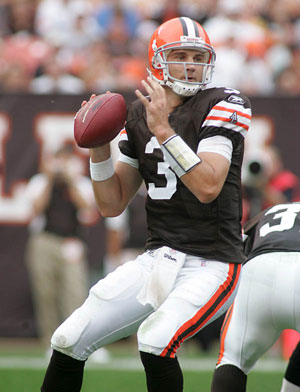 As we struggle to survive another season with the new-era Browns, one way we can try to get through it (besides alcohol or heavy medication) is to look back at the best individual weeks of the Browns’ new era to remember times in recent memory when this particular week didn’t suck.
As we struggle to survive another season with the new-era Browns, one way we can try to get through it (besides alcohol or heavy medication) is to look back at the best individual weeks of the Browns’ new era to remember times in recent memory when this particular week didn’t suck.
If there’s one thing Browns fans have gotten quite good at over the past 15 years, it’s declaring the arrival of a savior.
From Carmen Policy to Tim Couch to Courtney Brown to Butch Davis to William Green to Brady Quinn to Peyton Hillis, it’s essentially become a biannual tradition to anoint somebody the dude who’s going to turn things around and lead the Browns into an era of sunshine and lollipops.
Frankly, it doesn’t take much to earn the distinction.
For example, you don’t even have to be a No. 1 draft pick. One of the quickest savior-to-sucker transformations we’ve seen was by a dude who was a sixth-round draft choice - and not even our sixth-round draft choice.
Derek Anderson had been drafted by the Baltimore Ravens in 2005, but didn’t make the team. The Browns claimed him off waivers and he spent the rest of the season holding down every American’s dream job: the inactive third-string quarterback.
He entered 2006 as Charlie Frye’s backup (quite a distinction, to be sure), and was thrust into the spotlight in Week 13 when Frye was injured early in what appeared would be the Browns’ ninth defeat of the season.
Against a solid Kansas City team that wound up making the playoffs, the Browns fell behind 28-14 in the opening minutes of the fourth quarter. Their only hope for a comeback victory was Anderson - whom many in the stands at Cleveland Browns Stadium were confusing with the Cavaliers’ 1997 No. 1 draft pick.
But with the Browns in trouble - and arguably, having nothing to lose - Anderson sparked the offense to a touchdown on the next series, a short scoring pass to tight end Steve Heiden. After the Cleveland defense forced a punt, Anderson and Co. took over at their own 30 with just over five minutes remaining and gradually marched downfield. From the Kansas City 3 with 40 seconds left, Anderson hit Heiden again, this time for the game-tying score.
In the telling of this tale (on the incredibly rare occasions when it’s told), it’s often forgotten that the Browns had a chance to win the game seconds later when Willie McGinest recovered a Chiefs‘ fumble at the Kansas City 42 with 15 seconds left. But Anderson promptly gave the ball right back with an interception that sent the game to overtime. We didn’t know it at the time, but that little sequence leading up to and including the pick had told us everything we’d ever need to know about Derek Anderson.
The Browns stopped the Chiefs on the first possession of sudden-death, then Anderson went to work again. He hit Kellen Winslow for a 26-yard gain to push the ball near midfield, then - looking like Forrest Gump, as Joe Jurevicius would describe later - rumbled upfield himself for a 33-yard gain to the Kansas City 12.
It was close enough for Phil Dawson, who kicked the game-winning field goal two plays later that allowed Browns fans to quickly pin all their hopes on this lanky quarterback they’d never heard of before. And might actually be the Cavs’ starting point guard.
He’d finished the day with decent numbers (12 for 21 for 171 yards with two scores and the afore-mentioned pick), but fans seized on his ability to bring the team back in the fourth quarter as that indescribable “it” factor that Couch, Holcomb, Garcia, Dilfer, and Frye had all lacked. In fact, it mirrored almost exactly Brian Sipe’s triumphant comeback debut in a thrilling win over Denver in 1974 that, in retrospect, served as a dazzling introduction for one of the most effervescent players in club history.
In Anderson’s case, it turned out not to be the lottery jackpot, but a $2 scratch-off winner. Anderson started three more games to wrap up 2006 - all losses - then lost the coin flip (er...battle for the starting quarterback position) to Frye in the preseason the following year. When Frye imploded in Week 1, Anderson stepped into his ideal environment: no pressure and no expectations, and excelled, right up to the point at which expectations emerged (and defenses adjusted). He then settled into the low tide of disappointment we remember all too well and became perhaps the first sixth-round draft pick to ever let down a team that didn’t draft him.
On the other hand, he did manage to lift our spirits for that brief period six years ago, teasing us to believe that once again, our savior had arrived.